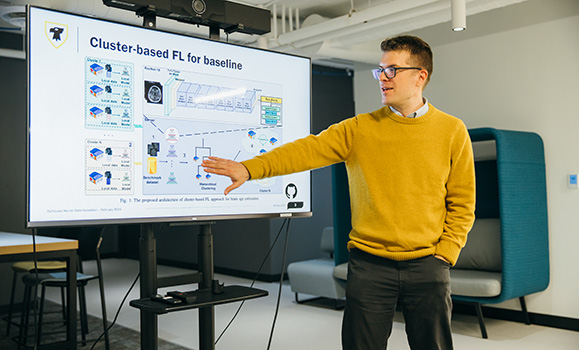When artificial intelligence comes up in conversation, more often than not there is an undercurrent of fear. And, while leading AI researcher Dr. Frank Rudzicz acknowledges we need to proceed with caution, his focus is squarely on the good it promises to deliver in health care and a long list of other fields that benefit humanity.
The universityās newestĢżKillam Memorial ChairĢżā a title provided to a select few researchers at the cutting edge of their fields ā aims to turn »Ź¹Ś²©²Źapp into hub for applied AI. Heās leading the development of a new research centre that will focus on harnessing the technology to improve the lives of Nova Scotians.
āWe need to create an environment where AI research isnāt just theoreticalāit also has to have direct impact,ā he says. āThat means working with local businesses, health-care providers, and policymakers to make sure the AI solutions we develop here in the province benefit the people who need it most.ā
NS health care, AI solutions
Dr. Rudzicz approaches AI with a health-first perspective ā a mindset that motivated his move to »Ź¹Ś²©²Źapp from the University of Toronto in 2023. He says Nova Scotia has unique advantages for integrating AI into health care compared to Ontario, where jurisdictional complexity creates significant barriers to implementation.
āOne of the reasons we should be doing this here in Nova Scotia ā and one of the reasons I came here ā is that because of our size, we have more of an opportunity to get things done,ā Dr. Rudzicz says. āThereās more collaboration possible here than what I was seeing in Ontario.ā
Because of our size, we have more of an opportunity to get things done
He says the governmentās progressive approach to technology in health care has also put the province in a strong position to harness AIās benefits. āI truly believe that this is a place where we can really lead on some actionable deployments,ā he says, pointing to the provinceās āā initiative as a major advantage in enabling AI models to work effectively across the health care system.
āIn Ontario, family medicine data and acute care data are often trapped in two separate systems, making it hard to predict long-term outcomes. In Nova Scotia, thereās an opportunity to unify that data, which is essential for AI applications in health care.ā
Hardwired for AI in health care
Dr. Rudziczās shift to a health focus in his AI research began during his PhD when his advisors steered him toward a project on natural-language processing and speech recognition to assist individuals with cerebral palsy. By recording speech patterns and creating datasets, he trained machine-learning models to help bridge the gap between intended words and how they were physically produced.
While large language models like those that drive ChatGPT have lessened the need to build datasets from scratch, the experience shaped his research trajectory. āFor me, the motivator was to make a real impact in people's lives and do good,ā he says. This led to a new focus on tackling inefficiencies in health care, beginning with early Alzheimerās and dementia diagnosis.
āWe wanted to take the burden off the system. We asked, āHow can we make it easier for clinicians to give assessments carefully and reproducibly? How can we make it possible for patients to not take valuable time out of their lives to get assessed by someone in a white coat?āā

Dr. Rudzicz believes AI can help reduce burdens on health-care systems in Canada.Ģż
In response to the challenge, Dr. Rudzicz and his students developed an AI-based test. It analyzes a personās voice via a web-based platform or over the phone, assessing over 1,000 parameters to determine the likelihood of dementia.
A 15-minute in-person, paper-based test became a 40-second recording. Recognizing the testās commercial potential, Dr. Rudzicz and his students launchedĢż, a startup that was acquired in 2023 by UK-basedĢż, a world leader in cognitive assessment.
Dr. Rudziczās research continues to move in numerous directions with a range of medical and potential commercial applications ā all aimed improving health outcomes.
Building an AI ecosystem
Dr. Rudzicz is excited about building a new centre of excellence for AI in Atlantic Canada. And, based on the engagement he experienced during the sold-out AI conference he chaired at Dal last May, he feels confident the foundation exists to build a thriving community around the technology. He says there is an opportunity for the region to play a stronger role in the federal governmentāsĢż, alongside established AI hubs in Ontario, QuĆ©bec, and Western Canada.
āI think it's important to have a lightning rod that everyone can see, so that they understand that this is a place to do AI,ā says Dr. Rudzicz, who remains a faculty member of TorontoāsĢż, a leading force in Canadaās AI landscape. By drawing lessons from Vectorās model, he believes »Ź¹Ś²©²Źapp can foster a thriving AI ecosystem that helps Nova Scotia and the region secure a seat at the national table.
I think it's important to have a lightning rod that everyone can see, so that they understand that this is a place to do AI
āWeāre just as strong as our peer universities across Canada,ā he says. āWe want to make sure that when people across the country ā or beyond ā are deciding where to study AI or grow their careers, they donāt just look to Southern Ontario or elsewhere ā they look here.ā
Ģż

